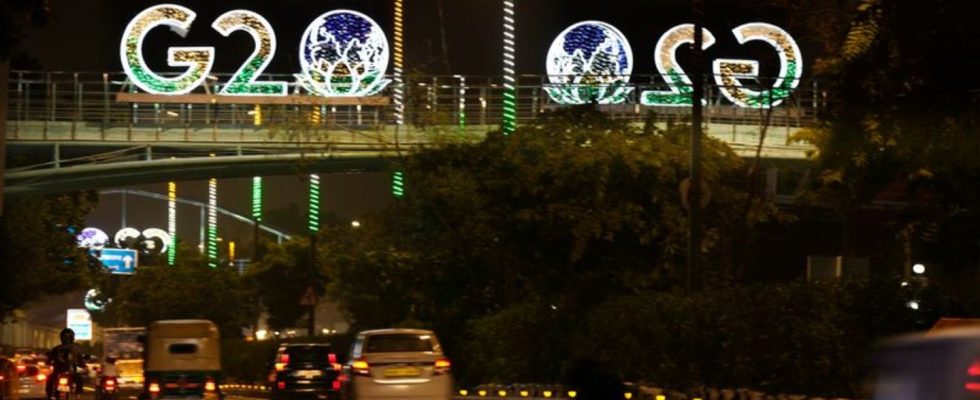summit
G20 states discuss joining the African Union
The federal government hopes that the African Union will be accepted into the influential G20 group of states at the upcoming summit in India. photo
© Manish Swarup/AP
In addition to the climate crisis and the stability of the global financial order, the G20 summit in India is also about expanding the group.
Shortly before the start of the The G20 summit in India brings the African Union (AU) into the group of leading and emerging economic powers closer.
The federal government is hoping to expand the influential G20 group of states to include the AU this weekend in New Delhi. There is fundamental agreement: “Nobody comes forward and says: We don’t want that,” said the German delegation.
However, it still needs to be clarified how other regional organizations such as the Asean Group of Asian States or the Celac of Latin American and Caribbean States should be dealt with, it said. It is conceivable that a commitment would also be made to start discussions with these organizations.
The powerful G20 members China, Russia and the USA, like Germany, have already clearly spoken out in favor of joining the AU. As host of the two-day summit, Prime Minister Narendra Modi is committed to strengthening the global south.
To date, the European Union with its 27 member states is the only regional organization that is a member of the G20. The AU includes all internationally recognized African countries as well as the controversial country of Western Sahara under international law. There are 55 states in total. The AU thus represents the interests of around 1.4 billion people. For comparison: only 447.7 million live in the European Union.
Heusgen for extension of G7 format
The head of the Munich Security Conference, Christoph Heusgen, spoke out in favor of expanding the G7 format of economically strong democracies in view of the international reorganization and an increasingly aggressive Chinese government. “I think it’s important that the G7 group expands,” he told the German Press Agency in Berlin. He added: “The Round is characterized by the fact that these are countries that share common values. They are democratic, market-economy countries.”
In addition to Germany, the G7 group also includes France, Italy, Japan, Canada, the USA, Great Britain and the EU. It is conceivable to accept democratically positioned countries from other continents, said Heusgen. “South Korea and Australia, for example. That could increase the effectiveness of the G7 format.”
Struggle for summit declaration
This time, in addition to Kremlin chief Vladimir Putin, Chinese state and party leader Xi Jinping is also staying away from the G20 meeting. It remains to be seen whether there will be a joint final declaration at the end, as usual. The background is the dispute between the West and Russia over the Russian war of aggression against Ukraine, which has been going on for more than a year and a half.
EU officials reported very difficult negotiations on the planned final declaration. Russia also dampened expectations of a summit declaration that would set out concrete goals and results. Kremlin spokesman Dmitry Peskov said the Russian chief negotiator was continuing to do “quite tense work” in preparing for the summit. Putin will not participate via video after his trip cancellation, he said.
Russian Foreign Minister Sergei Lavrov will do all the work for Moscow during the summit, Kremlin spokesman Dmitry Peskov said on Thursday. The Kremlin had long left it open whether Putin might take part as a speaker via video – as he did recently at the Brics summit (Brazil, Russia, India, China and South Africa).
Climate activists are putting pressure on the G20
From the perspective of climate activists, the major G20 economic powers should clearly commit to phasing out coal, oil and gas at their summit. The end of these fossil fuels should not be delayed or watered down, said Christoph Bals from Germanwatch. “China must also move.” This is the only way the Paris climate targets from 2015 can be met, he said.
Bals called for more ambition from the G20, such as reducing fossil fuel subsidies as quickly as possible. The G20 countries should also announce that they will triple their renewable energy capacities by 2030. That would make an agreement at the world climate conference in Dubai in December much more likely, it said.

